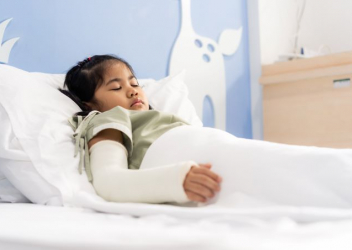Traumatic Stress Research and Programs
In partnership with the Center for Pediatric Traumatic Stress (CPTS), CIRP members conduct traumatic stress research to help children recovery emotionally after injury. For over two decades, the Child and Adolescent Reactions to Injury and Trauma (CARIT) research program at CIRP has conducted studies examining the range of responses that children (and their parents) experience during pediatric injury recovery, including child and parent coping strategies.
Our studies have found that psychological distress, including symptoms of posttraumatic stress disorder (PTSD), occurs in significant numbers of children and parents after unintentional injuries, interpersonal violence, and other difficult medical events.
Through the CARIT research program and CPTS, we contribute to an understanding of how children and parents manage the emotional impact of pediatric injury. Current efforts to address pediatric injury recovery focuses on sharing web-based resources for parents (www.AfterTheInjury.org) and clinicians (www.HealthCareToolbox.org).
Current Traumatic Stress Research Projects
- Current Areas of Pediatric Injury Recovery and Traumatic Stress Research
Child Trauma Data Archives
Our Center leads an international collaboration archiving and organizing datasets from around the world to advance understanding of how children recover after trauma and how interventions can help. The Prospective Studies of Acute Child Trauma and Recovery (PACT/R) Data Archive brings together datasets from studies that followed children after acute trauma exposure to track PTSD, risk, and protective factors. The Child Trauma Prevention and Treatment (CTPT) Data Archive will include datasets from intervention trials that evaluated prevention or treatment approaches to help children with acute or chronic trauma. By making data available to researchers around the world to conducted analyses across multiple studies and countries, the Child Trauma Data Archives have a continuing impact on child trauma research and treatment.
The first five studies in the new Child Trauma Data Collection Series are now accessible through the Data Sharing for Demographic Research (DSDR):
- CTDA 1003: Development of the Acute Stress Checklist for Children (ASC-Kids) in Children Age 8 to 17, United States, 2002-2004 CTDA
- CTDA 1004: Posttraumatic Stress in Youth Age 8 to 18 Seen in the Emergency Department for Violent Injury, United States, 1999-2000
- CTDA 1006: Validation of the Acute Stress Checklist for Children (ASC-Kids) in English & Spanish in Children Age 8 to 17, United States, 2007-2010
- CTDA 1022: Posttraumatic Stress in Children Age 7 to 17 Seen in Hospital for Acute Injury, Australia, 2004-2006
- CTDA 1032: Posttraumatic Stress in Children Age 7 to 15 Hospitalized for Burn or Traffic Injury and Their Parents, Switzerland, 2016-2018
- Creating and Disseminating Traumatic Stress Information and Interventions
Trauma-Informed Care Approach and Training
With support from the Center for Violence Prevention, CIRP researchers are developing and testing frameworks for a systems-based approach to trauma-informed care for those who work with children. Our team works with medical providers to develop and evaluate ways to incorporate prevention of traumatic stress and promotion of emotional recovery within pediatric medical settings. Our trauma-informed care training efforts grow directly from our research in this area.
Center for Pediatric Traumatic Stress (CPTS)
The Center for Pediatric Traumatic Stress (CPTS) at CHOP addresses medical trauma in the lives of children and families. The www.HealthCareToolbox.org website from CPTS provides a wealth of resources for healthcare professionals: a library of downloadable patient education handouts in English and Spanish for children, teens, and parents, and a set of interactive online courses in trauma-informed pediatric care that offer continuing education credit for nurses and psychologists.
Helping Parents Help Their Injured Child
AfterTheInjury.org is CIRP's award-winning website that helps parents help their children recover emotionally from an injury. Our team has evaluated the site's impact on parent knowledge, and we continue to develop and evaluate ways to ensure that parents find the website when they need it.
- Screening After Pediatric Injury
Screening and assessment allow healthcare providers to triage pediatric patients and families to the appropriate and needed level of psychosocial care. The Center for Pediatric Traumatic Stress has worked to develop and disseminate brief evidence-based screening tools for acute traumatic stress reactions in children and teens. Visit HealthCareToolbox.org to learn more about these screening measures and to select what tool may work best for your setting.
COVID-19 Exposure and Family Impact Scales (CEFIS)
The Center for Pediatric Traumatic Stress (CPTS) has developed a clinically useful instrument to measure families' exposure to potentially traumatic aspects of the COVID-19 epidemic. CEFIS, which is based on a trauma framework, is a measure that investigators can use in both clinical work and research.
The first paper on the caregiver-report CEFIS measure was recently published in the Journal for Pediatric Psychology. While the measure will continue to be studied and validated, initial analysis indicates the CEFIS to be a psychometrically sound, clinically useful instrument that measures families' exposure to potentially traumatic aspects of the COVID-19 pandemic.
The Cellie Coping Kit
The Cellie Coping Kit was created as a tool to support parents or other caregivers in helping their child and child's siblings manage the medical experience. This evidence-based coping tool was developed by researchers at Children's Hospital of Philadelphia and Kentucky Children's Hospital. The Cellie Coping Kit includes a stuffed toy named Cellie, coping cards, and a book for caregivers and can be used at home, in the clinic, or in the hospital.
The kit was designed to increase positive coping strategies utilizing evidence-based, cognitive-behavioral coping techniques (e.g., relaxation, social support) for a range of challenges, such as medical procedures, emotions related to the child's medical condition, recovery, and treatment, treatment side effects, and challenges related to school and peers.






